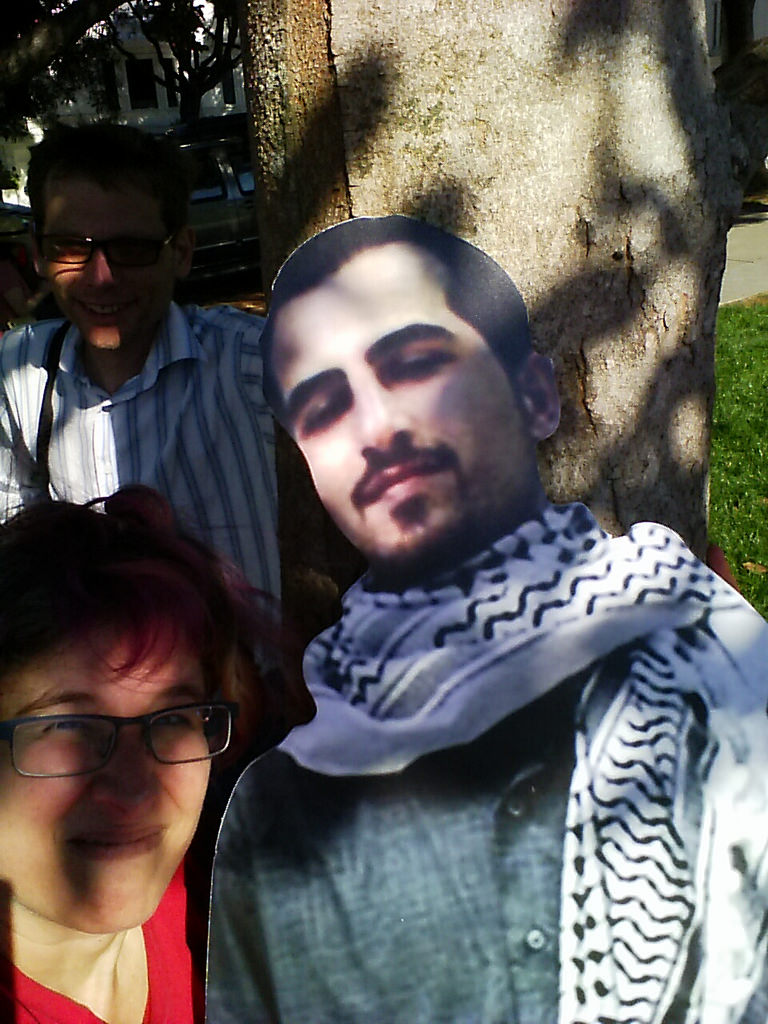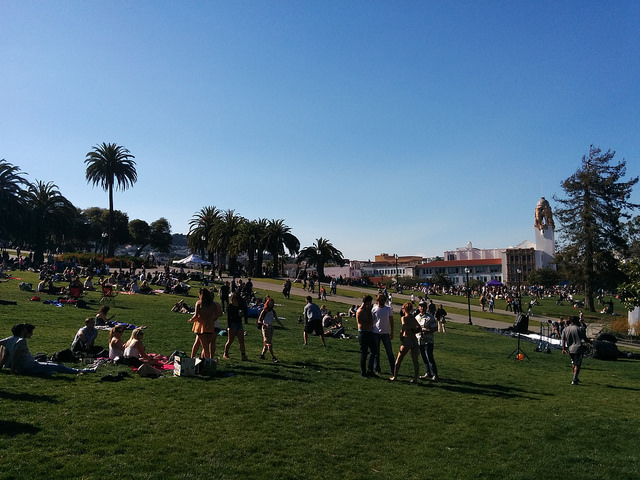This summer I went to a picnic in support of Bassel Khartabil, an open source software developer and volunteer who was detained in 2012 in Syria. Over the past years people have done all sorts of activism to keep his case public, holding Wikipedia editing parties, tweeting with #FreeBassel hashtag, writing letters, publishing books, and doing slightly weirder things like passing out masks of his face and bringing life size cardboard cutouts of him to tech conferences.
No one knows if he’s alive or dead and of course many other people are not only in prison in Syria but are surviving or dying in a horrifying war. I felt a bit odd about going to a picnic in Bassel’s honor. It comes down on some level to wanting to assert that we are part of the same cultural and political movement; Free/Libre Open Source Software, open culture, hackerspaces, access to technology and the means to speak and publish and share information.
I read Bassel: Behind the Screens of the Syrian Resistance and Waiting by Noura Ghazi Safadi. You can see early on when Bassel was detained, the EFF and the Mozilla Foundation, Creative Commons, and other organizations spoke up strongly calling for his release. Those efforts continued – Read the story of Bassel Khartabil, Syrian prisoner who lives and risks dying for a free Internet but last year in 2015 was the last anyone heard of him as he was transferred from one prison to possibly a military field camp.

So there we are in Dolores Park, feeling surreal, next to a big cardboard cutout of Bassel. We’re lying in the sun on a picnic blanket and lawn chairs watching people play frisbee and catching Pokémon, sharing delicious fruit and cookies, passing around a copy of The Cost of Freedom, an anthology by people working to help free Bassel. We ended up talking about our own work and our beliefs. I took notes as we all had neat ideas, but can’t find them now as I’m several notebooks past the summer by now. I do remember really enjoying talking with Mahmoud about his HatNote projects, like Weeklypedia and the strangely hypnotic Listen to Wikipedia.
Afterwards Niki sent round a play: A Picnic for Bassel in Three Acts. It gets a little bit of the flavor of that day, the intensity of our conversations, and the cognitive dissonance of being at a lovely picnic with friends while thinking to the horrors of repression, imprisonment, and war. It is really lovely to read and heartens me today.
DAKE: I see what you’re saying, but there is a human side to it too that you seem to be forgetting. Cause besides tweets that are headlines for articles that one might not read, there is also the tweet by itself as a piece of evidence, a storytelling tool, in journalism itself. And of course the author of the tweet, a person, with a life. And when someone becomes the person who is relied on for tweets about a certain topic, or about a current event, it can take quite a toll on them. Sometimes these people are located outside the geographic space in which a story, usually a conflict, is occurring, yet they become central information conduits regarding it. But they are less “on the ground” in it than they are adept in collecting, aggregating, and sharing information that is found online about it. Not only does erode the quality of stories, as journalists look to tweets about something rather than directly investigating the story by talking to the people involved in it, but it can also cause some trauma to the person who is “the conduit,” as people come to rely on them to provide information which they are themselves quite removed from.
ENBE: And then there are the “conduits” like Bassel who were actually on the ground and sharing information about what was actually happening, and who put themselves at great risk to share it. How can we better protect these people, both now and going forward, to help people not be arrested, and help those who, like Bassel, unfortunately have been?
DAKE: That is a tricky question because at least as far as the traditional ethics in journalism go, you only need to protect your sources if they ask you to, if they only agree to disclose what they do on condition of anonymity. But if the source is public there is no need to protect them.
LIRA: But that is based on older systems of sharing information, where the idea of a source being public, the very idea of a public, was very different. Fewer people could be public, in the sense of having access to an audience of strangers.
. . .
SAKI: Not so fast, buddy! A platform like this cannot be too easy to use so that people don’t consider the risks they are taking by using it. Think about situations like Bassel’s, before he was arrested, and in many ways why he was arrested. People who appoint themselves to a story that their country does not want to be told. And not just the story, but the tools to follow and tell a story, any story, and participate in the global, storytelling knowledge machine that shapes much of the Internet.
And that made him a threat to and target for his government. Because it is one thing to have a lot of followers, and be threatening because of your access to an eager audience, in a large scale, whose collective actions could be too easily choreographed in way that the ruling powers do not like. But it is another to also be an advocate for learning and open discussion, and well respected within international organizations dedicated to the same. Cause it is not just about stopping the flow of information that is transmitted through a person, it is about stopping the machinery that they are helping to build, the influence a person has on the way that people think, the infectious freedom of curiosity, debate, and optimistic discussion.
I recommend the entire strategy for activists. Have a picnic, have tea, invite people to discussions on a small scale and then go deep. Please, also enjoy yourselves and celebrate life while doing so. It is important to appreciate these moments of peace and happiness without closing our eyes to harsher realities.
